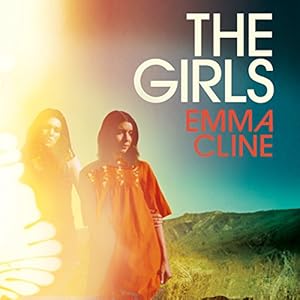read by Cady McClain
 The Girls has
achieved a startling and almost unprecedented amount of attention in all media
for its author Emma Cline – as well as an enviable advance, which, judging from
the print and radio reviews that have so far appeared, should pay royally for
the publishers’ three-book deal. It also was pirated online on publication day,
which might be a further measure of its notoriety and success.
The Girls has
achieved a startling and almost unprecedented amount of attention in all media
for its author Emma Cline – as well as an enviable advance, which, judging from
the print and radio reviews that have so far appeared, should pay royally for
the publishers’ three-book deal. It also was pirated online on publication day,
which might be a further measure of its notoriety and success.With the Manson murders now almost fifty years ago (1969) and the recent release on parole of Leslie Van Houten, one of the many convicted of complicity in the senseless and brutal Tate–La Bianca murders, much can only be expected in the next few years to recount the goings-on of the Family and Charlie Manson at Spahn Ranch, in the Hollywood Hills. Fire consumed the ranch fairly soon after the Manson trials, which might otherwise have been turned into a tourist destination. Many of those convicted are dead. Manson enjoys a cultish following, complete with website selling t shirts, music and ‘memorabilia’. The late Vincent Bugliosi’s account of his part in bringing Manson to justice remains a fascinating record of the LAPD at the time and of the sixties judicial system in the USA. It is a masterpiece in its own right and repays a close listen in the outstanding audiobook version read by Scott Brick.
So the only question
remains might be why it took so long to turn the stories, especially the
stories of Manson’s loyal ‘girls’ into fiction. There have been a number of
mainly ghost-written accounts of life at Spahn by a few of the people who hung
out there, including some of those convicted and imprisoned. But The Girls is arguably the first fully to
exploit the possibilities.
And although the book makes
for a compelling listen, I can’t quite see what all the fuss is about. As YA
fiction it ticks all those stereotypical boxes. But haven’t others done this
before? And better? Robin Wasserman’s Girls on Fire, for example, is more convincing, scarier,
more visceral. Alison Umminger’s My Favourite Manson Girl
is, I think, pithier and better written.
I hesitate over the creation of ‘Russell’ – the Charles Manson character. ‘Russell’ lacks the common quasi-friendly feeling of a Charles or a Charlie (think Chaplin and his girls). And so much is significant in the hint that Charlie was Christ, the son of God, of Man – Man’s Son – that ‘Russell’ just doesn’t even slightly hint at. I know this is fiction. But the cult idea and Russell’s musical ambitions, his way of making the most of anyone with the slightest influence or connection with fame, stardom and its inherent wealth are well exploited in The Girls. But, despite his depiction as a guitarist and his deep yearning for a recording contract, where is the music in the book? Where are the racial elements, the Bible, the obsession with others musicians’ lyrics? What is missing is some kind of helter skelter.
I hesitate over the creation of ‘Russell’ – the Charles Manson character. ‘Russell’ lacks the common quasi-friendly feeling of a Charles or a Charlie (think Chaplin and his girls). And so much is significant in the hint that Charlie was Christ, the son of God, of Man – Man’s Son – that ‘Russell’ just doesn’t even slightly hint at. I know this is fiction. But the cult idea and Russell’s musical ambitions, his way of making the most of anyone with the slightest influence or connection with fame, stardom and its inherent wealth are well exploited in The Girls. But, despite his depiction as a guitarist and his deep yearning for a recording contract, where is the music in the book? Where are the racial elements, the Bible, the obsession with others musicians’ lyrics? What is missing is some kind of helter skelter.
Cline’s prose has been praised. And there are fine passages. The fourteen-year-old Evie Boyd, with all her adolescent angst and desperation is good. But the middle-aged Evie is no monster: her links with the murders are third hand, her love for Susanna unconvincing.
